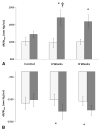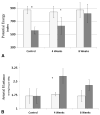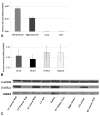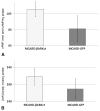AAV6-βARKct gene delivery mediated by molecular cardiac surgery with recirculating delivery (MCARD) in sheep results in robust gene expression and increased adrenergic reserve
- PMID: 22143102
- PMCID: PMC3666102
- DOI: 10.1016/j.jtcvs.2011.08.048
AAV6-βARKct gene delivery mediated by molecular cardiac surgery with recirculating delivery (MCARD) in sheep results in robust gene expression and increased adrenergic reserve
Abstract
Objective: Genetic modulation of heart function is a novel therapeutic strategy. We investigated the effect of molecular cardiac surgery with recirculating delivery (MCARD)-mediated carboxyl-terminus of the β-adrenergic receptor kinase (βARKct) gene transfer on cardiac mechanoenergetics and β-adrenoreceptor (βAR) signaling.
Methods: After baseline measurements, sheep underwent MCARD-mediated delivery of 10(14) genome copies of self-complimentary adeno-associated virus (scAAV6)-βARKct. Four and 8 weeks after MCARD, mechanoenergetic studies using magnetic resonance imaging were performed. Tissues were analyzed with real-time quantitative polymerase chain reaction (RT-qPCR) and Western blotting. βAR density, cyclic adenosine monophosphate levels, and physiologic parameters were evaluated.
Results: There was a significant increase in dP/dt(max) at 4 weeks: 1384 ± 76 versus 1772 ± 182 mm Hg/s; and the increase persisted at 8 weeks in response to isoproterenol (P < .05). Similarly, the magnitude of dP/dt(min) increased at both 4 weeks and 8 weeks with isoproterenol stimulation (P < .05). At 8 weeks, potential energy was conserved, whereas in controls there was a decrease in potential energy (P < .05) in response to isoproterenol. RT-qPCR confirmed robustness of βARKct expression throughout the left ventricle and undetectable expression in extracardiac tissues. Quantitative Western blot data confirmed higher expression of βARKct in the left ventricle: 0.46 ± 0.05 versus 0.00 in lung and liver (P < .05). Survival was 100% and laboratory parameters of major organ function were within normal limits.
Conclusions: MCARD-mediated βARKct delivery is safe, results in robust cardiac-specific gene expression, enhances cardiac contractility and lusitropy, increases adrenergic reserve, and improves energy utilization efficiency in a preclinical large animal model.
Copyright © 2012 The American Association for Thoracic Surgery. Published by Mosby, Inc. All rights reserved.
Figures





Similar articles
-
MCARD-mediated gene transfer of GRK2 inhibitor in ovine model of acute myocardial infarction.J Cardiovasc Transl Res. 2013 Apr;6(2):253-62. doi: 10.1007/s12265-012-9418-z. Epub 2012 Dec 1. J Cardiovasc Transl Res. 2013. PMID: 23208013 Free PMC article.
-
Safety and efficacy of high-dose adeno-associated virus 9 encoding sarcoplasmic reticulum Ca(2+) adenosine triphosphatase delivered by molecular cardiac surgery with recirculating delivery in ovine ischemic cardiomyopathy.J Thorac Cardiovasc Surg. 2014 Sep;148(3):1065-72, 1073e1-2; discussion1072-3. doi: 10.1016/j.jtcvs.2014.05.070. Epub 2014 Jun 7. J Thorac Cardiovasc Surg. 2014. PMID: 25037619 Free PMC article.
-
Myocardial adeno-associated virus serotype 6-betaARKct gene therapy improves cardiac function and normalizes the neurohormonal axis in chronic heart failure.Circulation. 2009 Jan 6;119(1):89-98. doi: 10.1161/CIRCULATIONAHA.108.803999. Epub 2008 Dec 22. Circulation. 2009. PMID: 19103992 Free PMC article.
-
A pharmacokinetic analysis of molecular cardiac surgery with recirculation mediated delivery of βARKct gene therapy: developing a quantitative definition of the therapeutic window.J Card Fail. 2011 Aug;17(8):691-9. doi: 10.1016/j.cardfail.2011.03.011. Epub 2011 Jun 14. J Card Fail. 2011. PMID: 21807332 Free PMC article.
-
Myocardial gene delivery using molecular cardiac surgery with recombinant adeno-associated virus vectors in vivo.Gene Ther. 2011 Jun;18(6):546-52. doi: 10.1038/gt.2010.168. Epub 2011 Jan 13. Gene Ther. 2011. PMID: 21228882 Free PMC article.
Cited by
-
MCARD-mediated gene transfer of GRK2 inhibitor in ovine model of acute myocardial infarction.J Cardiovasc Transl Res. 2013 Apr;6(2):253-62. doi: 10.1007/s12265-012-9418-z. Epub 2012 Dec 1. J Cardiovasc Transl Res. 2013. PMID: 23208013 Free PMC article.
-
Gene therapy for heart failure.Circ Res. 2012 Mar 2;110(5):777-93. doi: 10.1161/CIRCRESAHA.111.252981. Circ Res. 2012. PMID: 22383712 Free PMC article. Review.
-
Analysis of recombinant adeno-associated viral vector shedding in sheep following intracoronary delivery.Gene Ther. 2019 Sep;26(9):399-406. doi: 10.1038/s41434-019-0097-0. Epub 2019 Aug 29. Gene Ther. 2019. PMID: 31467408
-
GRK2 moderates the acute mitochondrial damage to ionizing radiation exposure by promoting mitochondrial fission/fusion.Cell Death Discov. 2018 Feb 14;4:25. doi: 10.1038/s41420-018-0028-7. eCollection 2018 Dec. Cell Death Discov. 2018. PMID: 29531822 Free PMC article.
-
Current Landscape of Heart Failure Gene Therapy.J Am Heart Assoc. 2019 May 21;8(10):e012239. doi: 10.1161/JAHA.119.012239. J Am Heart Assoc. 2019. PMID: 31070089 Free PMC article. Review. No abstract available.
References
-
- Lefkowitz RJ, Rockman HA, Koch WJ. Catecholamines, cardiac β-adrenergic receptors, and heart failure. Circulation. 2000;101:1634–7. - PubMed
-
- Rockman HA, Koch WJ, Lefkowitz RJ. Seven-transmembrane-spanning receptors and heart function. Nature. 2002;415:206–12. - PubMed
-
- Koch WJ, Rockman HA, Samama P, Hamilton RA, Bond RA, Milano CA, et al. Cardiac function in mice overexpressing the β-adrenergic receptor kinase or a βARK inhibitor. Science. 1995;268:1350–3. - PubMed
-
- Emani SM, Shah AS, Bowman MK, White DC, Emani S, Glower DD, et al. Right ventricular targeted gene transfer of a beta-adrenergic receptor kinase inhibitor improves ventricular performance after pulmonary artery banding. J Thorac Cardiovasc Surg. 2004;127:787–93. - PubMed
Publication types
MeSH terms
Substances
Grants and funding
LinkOut - more resources
Full Text Sources
Medical

